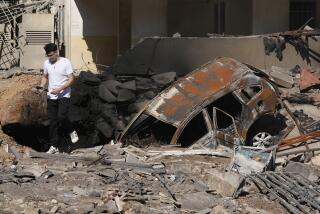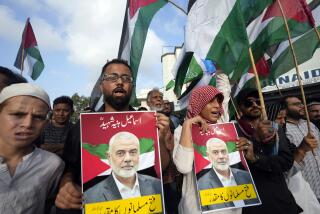Taliban leader confirmed killed in U.S. airstrike as focus turns to his successor
- Share via
Reporting from Kabul, Afghanistan — Afghan and Pakistani officials confirmed Sunday that the leader of the Taliban, Mullah Akhtar Mohammad Mansour, was killed in a U.S. drone strike in Pakistan, setting off a pivotal succession battle inside the insurgent movement that could further challenge U.S.-backed efforts to start negotiations aimed at ending the 15-year war in Afghanistan.
The Afghan intelligence agency, the National Directorate of Security, said in a statement that Mansour was killed in an airstrike Saturday afternoon while traveling in a car in Pakistan’s Baluchistan province. A senior Pakistani official also confirmed Mansour’s death.
During his trip in Vietnam, President Obama said in a statement that Mansour’s death was an “important milestone” in helping bring peace to Afghanistan. He said the U.S. would keep targeting extremist networks that threaten the United States.
The Taliban did not immediately issue a statement, but the shura, or leadership council, called a meeting beginning Sunday, according to an individual close to the Taliban. Such meetings are usually called to discuss matters of extreme importance, said the individual, who could not be named for security reasons.
Mansour was appointed last summer after the Taliban confirmed that its founder, Mullah Mohammad Omar, had died after a long absence. His appointment sparked a power struggle that has left the insurgent movement, which had been largely cohesive under Omar, more divided than ever — even as the group gained more territory in northern and southern Afghanistan.
Once regarded as a proponent of ending hostilities against Afghan and U.S.-led international forces and entering into peace talks, Mansour presided over a resurgence of the Taliban’s fighting capabilities and made a public statement last year calling for “jihad until we bring Islamic rule” to Afghanistan.
The increased insurgent attacks pushed civilian casualties in Afghanistan last year to their highest levels since the United Nations began tracking figures several years ago. The failures of Afghan government forces forced the White House to delay plans to withdraw the remaining 9,800 U.S. troops stationed in the country.
With the Taliban succeeding on the battlefield — capturing the northern city of Kunduz briefly last fall — Afghan President Ashraf Ghani’s efforts to engage the Taliban in direct talks for the first time failed to make progress. At the latest meeting between diplomats from Afghanistan, Pakistan, the U.S. and China — all of whom are pressing for negotiations —– the Afghan ambassador to Pakistan, Omar Zakhilwal, described the Taliban as “irreconcilable.”
[Mansour was] the main figure preventing the Taliban from joining in the peace process.
— Abdullah Abdullah, Afghanistan’s chief executive
In recent months, Afghan officials repeatedly called on Pakistan — where the Taliban leadership is based — to take action against Taliban leaders who were opposed to peace talks.
The airstrike, which Pentagon officials said was ordered by President Obama, marked a swift escalation of U.S. firepower against the Taliban, which the U.S. government has not labeled a terrorist group. In the past, top U.S. officials have said they would not target members of the group in airstrikes unless they posed a direct threat to U.S. forces or interests.
In 2011, Vice President Joe Biden said, “The Taliban per se is not our enemy.”
But on Sunday, Secretary of State John F. Kerry offered a justification for the airstrike, saying that Mansour “posed a continuing, imminent threat to U.S. personnel in Afghanistan, to Afghan civilians, Afghan security forces and Resolute Support coalition members across the country.” Resolute Support is the name of the U.S.-led NATO military force in Afghanistan.
“This action sends a clear message to the world that we will continue to stand with our Afghan partners as they look to build a more stable, united, secure and prosperous Afghanistan,” Kerry told reporters in Myanmar, where he was on an official visit.
Afghanistan’s chief executive, Abdullah Abdullah, said Mansour was “the main figure preventing the Taliban from joining in the peace process” and had “intensified violence against ordinary civilians.”
Yet Mansour’s demise could make the Taliban even less amenable to negotiations.
While the Taliban’s internal workings are rarely transparent to outsiders, the primary candidates to succeed Mansour are believed to be his two deputies: Sheikh Haibatullah Akhundzada, an elderly religious scholar, and Sirajuddin Haqqani, the operational commander of the hard-line Haqqani network, one of the most potent fighting forces inside the insurgent movement.
Haqqani, whose fighters are blamed for some of the deadliest attacks against Afghan and U.S.-led international forces in recent years, is reported to have gained standing inside the Taliban’s central leadership in recent months. The group’s past suggests to some observers that if Haqqani were to take control, the Taliban would become even more potent and deadly.
Mansour’s death “would definitely further strengthen the Haqqani network,” said Mushtaq Yusufzai, a journalist in Peshawar, Pakistan, who closely follows the Taliban. Pakistan’s security establishment, which is believed to have influence over senior Taliban leaders, is also reported to be close to Haqqani.
Others say Akhundzada, a former head of the Taliban’s religious courts, could have the upper hand. He was close to the group’s founder and spiritual leader, Mullah Mohammad Omar, according to an analysis by Thomas Ruttig and Borhan Osman of the Afghanistan Analysts Network, a Kabul-based research group.
Wahid Mujda, a former official in the Taliban government that led Afghanistan until the 2001 U.S.-led invasion, said the succession process could take months.
“When Mullah Omar’s death was announced, Mullah Mansour had already been serving as a de facto leader,” said Mujda, now a political analyst. “This time there is no clear successor or exact procedure for electing a new leader. A new leader must be elected, but it won’t be quick this time.”
Haji Din Mohammad, a member of the Afghan government’s High Peace Council, which is charged with negotiating with the Taliban, said there were other contenders — including relatives of Omar, who were believed to oppose Mansour’s leadership.
“Mansour’s death doesn’t necessarily mean that peace is closer than it was yesterday,” Mohammad said.
Details of the airstrike emerged slowly from Baluchistan, one of Pakistan’s most inaccessible regions. Residents reached by telephone said a Toyota coming from Taftan, a town near the Pakistani border with Iran, was targeted on a highway about 40 miles from the border and two people inside were killed.
Bodies were taken to a government-run hospital and were expected to be shifted to Quetta, the provincial capital, for autopsy, officials said.
Reports from Pakistani officials and media sources said the driver of the car was killed along with a man — presumed to be Mansour — who was carrying a Pakistani passport under the name of Wali Muhammad.
The Pakistani government issued a statement saying that U.S. officials informed Prime Minister Nawaz Sharif of the strike after it happened, which it called “a violation of its sovereignty” — language Pakistan often uses to distance itself from U.S. strikes on its soil.
The U.S. has often carried out aerial attacks against suspected militants with tacit Pakistani support, although this was a rare U.S. attack outside Pakistan’s northern tribal areas.
In 2011, U.S.-Pakistani relations soured after U.S. forces secretly raided former Osama bin Laden’s hideout in Abbottabad, killing the former Al Qaeda leader.
Special correspondent Latifi reported from Kabul and staff writer Bengali from Cairo. Special correspondents Zulfiqar Ali in Peshawar, Pakistan, and Aoun Sahi in Islamabad, Pakistan, contributed to this report.
ALSO
Fifty years later, the first campus massacre lives on
Surfing icon Laird Hamilton shares his 10-point plan to live forever
EgyptAir crash raises new questions about European airport security
Follow @SBengali on Twitter for more news from South Asia
UPDATES:
11:08 p.m.: This story was updated with a statement from President Obama.
8:24 a.m.: This story was updated with new details throughout.
The first version of this article was published at 2:58 a.m.
More to Read
Sign up for Essential California
The most important California stories and recommendations in your inbox every morning.
You may occasionally receive promotional content from the Los Angeles Times.











